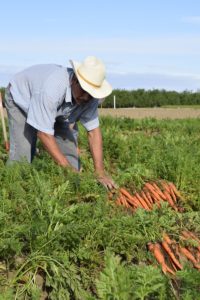How to Keep Produce Fresh Longer?
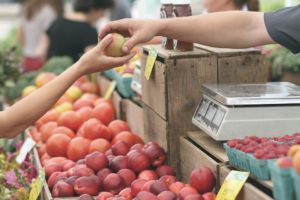
The best food is the one which is fresh, and that’s something we can all agree on. However, it’s not possible to have fresh veggies and fruits at your disposal at all times. So how to keep produce fresh longer?
Not all of us cook every day, and not all of us can go and buy the ingredients every time we have to cook. If you’re anything like me, you cannot resist but buy more fresh produce than you can cook in the next few days. I mean, who can resist bright, crisp greens or that shiny radish!
There are storage hacks when it comes to produce that can elongate the freshness for a little while longer. That way, not only do you save your money and the environment, but also enjoy the fresh taste even after days of buying it.
Buy Fresh to Keep Fresh
You can only keep your veggies fresh longer if they are fresh when you buy them. So when you’re in the produce section, pay attention to the little things. Here are some indications of freshness in veggies:
- The leafy greens should be bright in color and not have any limping or yellowing leaves.
- Cruciferous vegetables like broccoli, cabbage, or cauliflowers should be heavy enough for their size and without any visible blemishes or marks.
- Tomatoes should be plump and not too soft from certain areas, especially near the stem where the bruising and rot usually begin from.
Tips to Keep Produce Fresh Longer
Now, let’s discuss some important tips and tricks for keeping your produce fresh for longer:
Not Everything Needs to Be Refrigerated
A lot of your produce does belong in the refrigerator as it can start to go bad fairly sooner at room temperature. Those who live in very hot climates know that very well!
That said, some vegetables stay fresh longer at room temperature, with a little bit of air circulation. Onion, root vegetables, and garlic don’t necessarily need to be refrigerated.
One mistake to avoid when leaving them at room temperature is using plastic bags. These veggies need good air circulation to stay fresh and packing them in bags will just hamper that. This also goes for those perforated bags and sacks these vegetables sometimes come in.
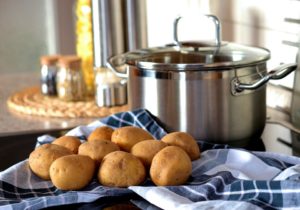
Another vegetable that can survive long enough at room temperature is tomatoes. Yes, most people do keep their tomatoes in the fridge. However, if the room temperature is less than 70 degrees, you can keep tomatoes in the kitchen.
Just make sure to line the bowl with a paper towel and don’t place them anywhere with direct sunlight or another heat source.
Keep Ethylene Producing Fruits Separate
Did you know that some fruits produce a gas called ethylene? Well, fruits like bananas, apples, peaches, pears, and kiwis produce it. These fruits should be kept separate from produce that is ethylene sensitive.
Ethylene causes those sensitive veggies to spoil and rot quickly. Here’s an exhaustive list of both types of produce.
If you notice, some ethylene producers are also ethylene-sensitive. So don’t keep apples with bananas!
This separation rule applies at both room temperature and fridge temperatures. In fact, make a habit of carrying these in separate bags when you do your grocery shopping.
Keep Potatoes Separate from Onion and Garlic
Yes, as I mentioned, these do absolutely fine at room temperatures, but don’t store all of them at the same place, or worse, in the same bowl.
Potatoes should be separate from onion and garlic, and ideally in a dark place with ample humidity. On the other hand, onions and garlic appreciate humidity.
Wash Berries with Hot Water
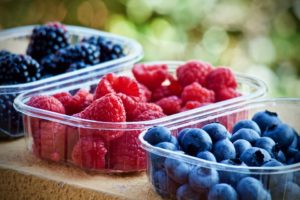
Your berries can start to rot fairly quicker in warm weather. The best way to deal with this is to give the berries a quick hot bath, but not with boiling hot water. The temperature of the water should be 100 to 125 degrees, so the hot water from the tap is good enough.
This basically helps remove any mold spores while also cleaning them once again. After giving them a quick hot, spread them out on a paper towel and let them air dry for a few minutes. Then store them in the refrigerator in a container (not airtight).
Store Tubers the Right Way
The good news is that tubers like beets, turnips, parsnips, and carrots usually stay good for long. However, they should be stored the right way to keep that freshness intact.
First of all, take any leaves off their tops when storing them in the refrigerator. If you think you’ll use them in a week or two, you can just toss them in the crisper box without any bag or container. However, for an even longer duration, store them in a plastic bag (reusable ziplock bags recommended).
Also, these can be stored with any other vegetables and fruits because they don’t produce a large amount of ethylene.
Don’t Wash Leafy Greens Before Storing/Use Paper Towels
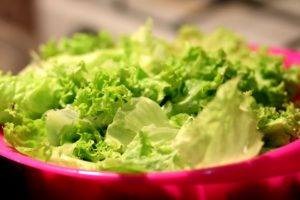
Leafy greens are typically the quickest to go bad as they don’t stay fresh very long. However, how you store them in the refrigerator can help.
First of all, never wash them before storing them. You can wash them when you’re about to use them.
Secondly, for maximum freshness, wrap some paper towels around the leaves and then put them in sealed ziplock bags. The paper towels help absorb the excess moisture they produce or get from the surroundings.
Keep Cut Cabbage in Sealed Container
Cabbage can be stored without any container when it’s whole. However, if you’ve cut it and haven’t used the whole thing, make sure to keep the remaining part in a sealed container. Otherwise, it can quickly turn color and lose its freshness.
Wrap Up
Now that you understand how to keep produce fresh longer with these little tips, you can get your money’s worth. I find it best to plan the meals and dishes I’m going to cook before I go to the grocery store or plan them according to the produce I just bought.
Have some potatoes that have been lying around for too long? Make a vegan mash! Greens losing their crispness, make a smoothie in the morning. Just plan ahead and be creative, and your produce will never end up in the trash.
